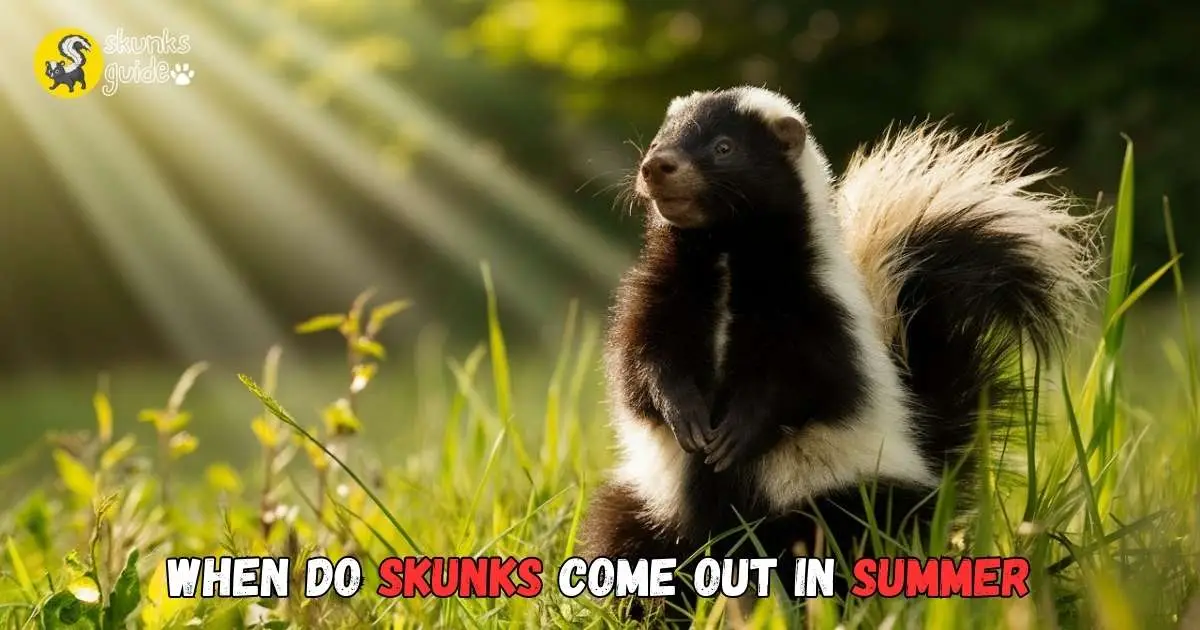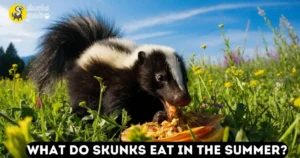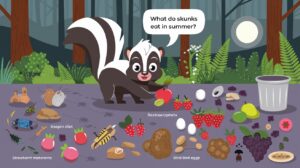what time do skunks come out
They usually appear at dawn and dusk, especially between late spring and early fall. Through my skunk research, I’ve uncovered why these animals stick to those hours. Keep reading to learn more about their summer behavior and how it could help you keep your home and garden safe from unwanted visitors!
Introduction To Skunk Habits
Understanding skunk habits helps us know when to expect them. Skunks are nocturnal creatures. They prefer to be active at night. During summer, their behavior changes slightly. Knowing their activity patterns can help avoid unwanted encounters.
Skunk Activity Patterns
Skunks are known for their unique habits. Here are some key points about their activity:
- Skunks are primarily nocturnal.
- They emerge around dusk and stay active until dawn.
- During the day, skunks rest in burrows or dens.
- They are opportunistic feeders and search for food at night.
Skunks use their keen sense of smell to locate food. Their diet includes:
| Food Type | Description |
|---|---|
| Insects | Beetles, crickets, and caterpillars. |
| Fruits | Ripe berries and fallen apples. |
| Small Animals | Rodents and small birds. |
| Human Food | Trash, pet food, and garden vegetables. |
Summer Behavior Shifts
Summer brings some changes in skunk behavior. Here’s what to expect:
- Skunks may be more active due to warmer temperatures.
- They often have increased foraging needs in summer.
- Skunks may travel longer distances for food.
- Breeding season occurs, leading to more sightings.
These changes mean skunks may come out earlier or later than usual. Watch for them during warm summer nights.
Temperature’s Role In Skunk Emergence
Summer brings warmer days. Skunks adjust their behavior based on temperature. Understanding this helps us know when they come out.
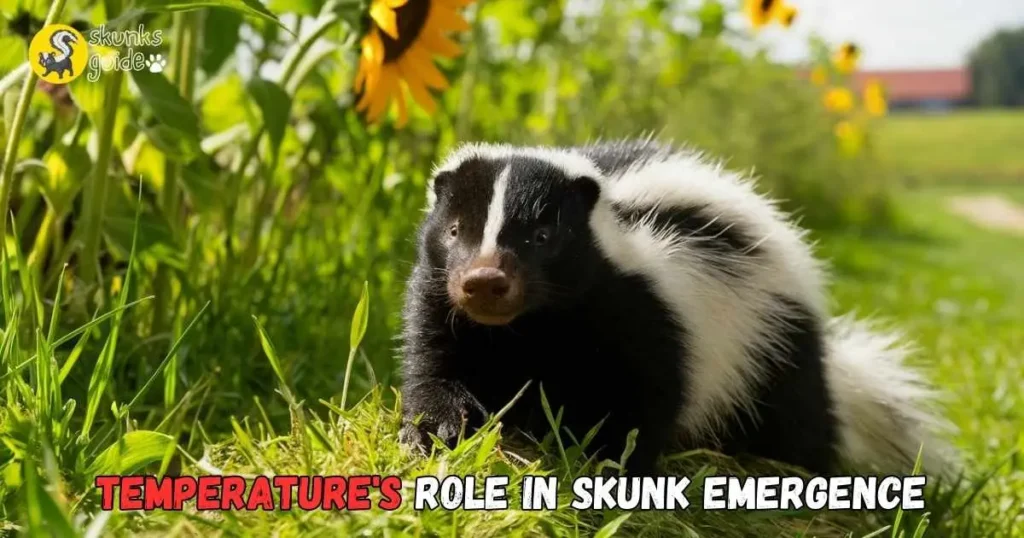
Heat Tolerance
Skunks have a specific heat tolerance. They thrive in temperatures between 70°F to 80°F.
- Below 70°F: Skunks are more active.
- Above 80°F: They seek shade and cool areas.
- Extreme Heat: Skunks become less active.
When temperatures soar, skunks avoid heat. They will rest in burrows or shaded spots. This helps them survive hot days. Nighttime is cooler, so they emerge more often.
Seeking Cool Shelter
During hot summer days, skunks search for cool places. They prefer areas with:
| Type of Shelter | Benefits |
|---|---|
| Dense Vegetation | Provides cover and cooler temperatures. |
| Burrows | Offers protection from heat and predators. |
| Shaded Areas | Reduces direct sunlight exposure. |
Skunks also hide under decks or in garages. This keeps them safe from heat. As temperatures drop in the evening, skunks become more active. They venture out to find food.
Feeding And Foraging
Summer is a prime time for skunks to search for food. They are active at night, foraging for meals. Understanding their feeding habits helps in avoiding unwanted encounters.
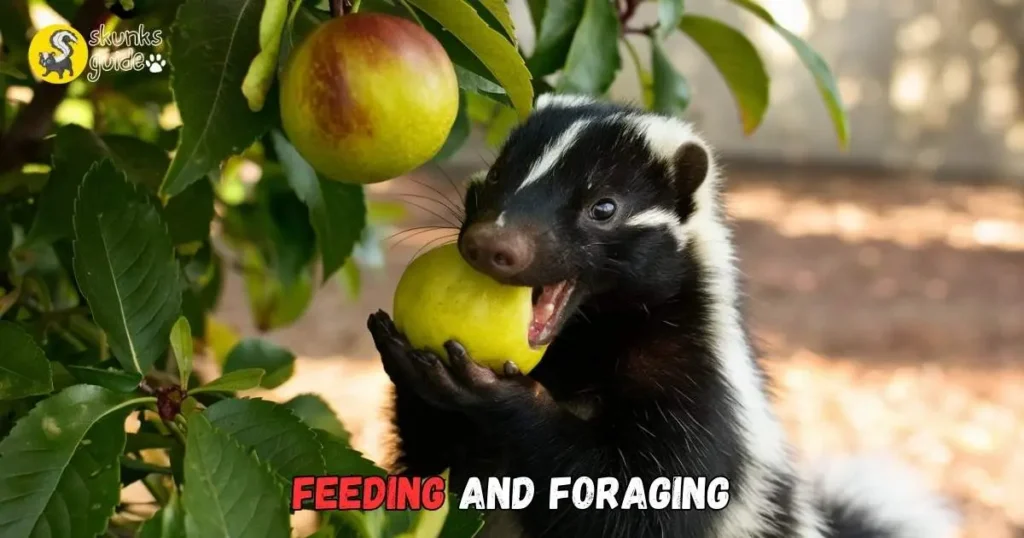
Dietary Preferences
Skunks are omnivores. They eat a mix of plants and animals. Their diet includes:
- Fruits: Berries, apples, and grapes.
- Vegetables: Corn, carrots, and leafy greens.
- Insects: Beetles, crickets, and grasshoppers.
- Small animals: Mice, birds, and eggs.
Skunks are opportunistic feeders. They will eat whatever is available. They use their keen sense of smell to locate food.
Summer Food Sources
During summer, skunks have abundant food options. Here are some common sources:
| Food Source | Availability |
|---|---|
| Fruits | June to September |
| Vegetables | Late spring to early fall |
| Insects | All summer |
| Small Animals | Year-round |
Skunks often raid gardens and trash cans. They are attracted to easy meals. Homeowners should secure trash and remove ripe fruits.
Being aware of skunk feeding habits helps in preventing conflicts. Keeping yards tidy reduces chances of attracting them.
Breeding Season And Offspring
During summer, skunks have an important breeding period. Understanding their mating habits and how they care for their young can help us appreciate these unique animals.
Mating Patterns
Skunks typically mate in late winter to early spring. This timing helps ensure the young are born in warmer months. Here are some key points about skunk mating patterns:
- Male skunks often roam in search of females.
- Females emit strong scents to attract males.
- Mating usually occurs at night, when skunks are most active.
After mating, female skunks carry their young for about two months. They generally give birth in late spring or early summer. A typical litter consists of 4 to 7 kits.
Caring For The Young
After birth, the female skunk plays a vital role in raising her kits. She cares for them in a safe den. Here are some important aspects of skunk parenting:
- Mother skunks nurse their young for about 8 weeks.
- Kits stay with their mother until fall.
- She teaches them to hunt and find food.
Young skunks are born blind and helpless. They start to open their eyes after about 3 weeks. By summer, they begin to explore outside the den.
| Stage | Time Frame | Notes |
|---|---|---|
| Mating | Late Winter to Early Spring | Nighttime activity |
| Gestation | About 2 Months | Safe den location |
| Nursing | Up to 8 Weeks | Mother provides care |
| Exploration | Summer | Young start to roam |
Safety And Prevention Tips
Summer brings warm nights and active wildlife. Skunks are more active during this season. Knowing how to prevent unwanted encounters is essential. Here are effective tips to stay safe.
Avoiding Skunk Spray
Skunk spray can cause strong odors and irritation. Follow these tips to avoid it:
- Stay calm if you see a skunk.
- Do not approach or try to scare it away.
- Keep pets on a leash during walks.
- Stay away from areas with strong odors.
Securing Outdoor Spaces
Protect your yard and home from skunks. Use these strategies:
| Tip | Description |
|---|---|
| Seal Garbage Cans | Use tight-fitting lids to keep food smells inside. |
| Remove Pet Food | Don’t leave food outside overnight. |
| Close Off Hiding Spots | Fill in holes under decks or sheds. |
| Use Fencing | Install barriers to keep skunks out. |
Keep your outdoor areas clean and tidy. Regular maintenance helps reduce skunk attraction. Always be aware of your surroundings during summer nights.
Understanding Skunk Activity Peaks
Skunks are most active during specific times of the day. Knowing when they come out helps avoid unwanted encounters. Their behavior changes with the seasons, especially in summer. Let’s explore their activity patterns.
Dusk And Dawn Timings
Skunks prefer the coolness of twilight. They often venture out at:
- Dusk: Just after sunset
- Dawn: Just before sunrise
During these hours, skunks search for food. They are less active during the heat of the day. This behavior helps them stay safe from predators.
Moonlight Influence
Moonlight affects skunk activity. Bright nights encourage more movement. Skunks feel safer under the cover of darkness.
Consider these moon phases:
| Moon Phase | Skunk Activity Level |
|---|---|
| New Moon | Low Activity |
| First Quarter | Moderate Activity |
| Full Moon | High Activity |
| Last Quarter | Moderate Activity |
Full moons increase skunk movement. They search for food more actively. Understanding these patterns helps in avoiding encounters.
Frequently Asked Questions
What Month Are Skunks Most Active?
Skunks are most active during spring and summer months. They emerge from hibernation and search for food and mates. Activity peaks from March to September, especially at dusk and dawn. Understanding their behavior can help reduce unwanted encounters.
Why Are Skunks Out In July?
Skunks are active in July due to warm weather and abundant food sources. This month marks peak foraging time as they search for insects, fruits, and small animals. Their reproductive season also influences their increased activity, as they care for their young during this warm summer period.
What Attracts Skunks To Your Yard?
Skunks are attracted to yards by food sources like pet food, garbage, and fallen fruit. They also seek shelter in dense vegetation or under decks. Water sources, such as bird baths or ponds, can draw them in as well. Keeping your yard clean can help deter skunks.
What Time Of Year Do Skunks Spray The Most?
Skunks spray most during spring and summer. This is their mating season, when they feel threatened or need to defend territory. Young skunks also start to disperse during this time, increasing encounters with humans and pets. Awareness helps avoid unwanted skunk encounters.
Conclusion
Understanding skunk behavior in summer is essential for avoiding unwanted encounters. They are most active during dusk and dawn, seeking food and mates. By being aware of their habits, you can minimize conflicts. Keep your yard clean and secure to deter these nocturnal creatures and enjoy a skunk-free summer.

